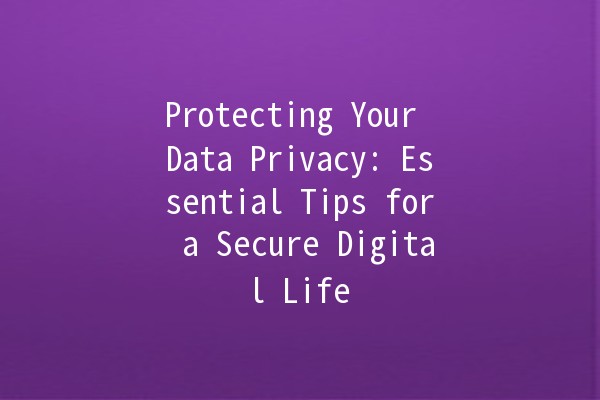
In today’s fastpaced digital world, ensuring data privacy is paramount for both individuals and businesses. The increasing frequency of data breaches and cyberattacks emphasizes the need for robust privacy protection measures. This article provides practical strategies to help you safeguard your personal information and enhance your online security. We'll explore five actionable tips that you can implement right away, ensuring you stay in control of your digital footprint.
Understanding Data Privacy
Data privacy refers to the proper handling, processing, and storage of sensitive data, emphasizing the user's right to control who has access to their information. The rise of technology necessitates a thorough understanding of data privacy issues, including the risks associated with sharing personal information online.
Importance of Data Privacy
Protecting your data is critical for several reasons:

Effective Tips to Enhance Data Privacy
Explanation: The first line of defense against unauthorized access to your accounts is a robust password. Weak or reused passwords are an open invitation to hackers.
Practical Application: Create complex passwords consisting of a combination of letters, numbers, and symbols. Avoid using easily guessable information, such as birthdays or names. For convenience, consider using a password manager to generate and securely store your passwords.
Explanation: Twofactor authentication adds an extra layer of security by requiring not just your password, but also a second form of verification—like a text message code or an authentication app.
Practical Application: Activate 2FA on all accounts that support it. This may involve linking your phone or an app, such as Google Authenticator or Authy, to your account for additional verification. This way, even if someone obtains your password, they cannot access your account without the second factor.
Explanation: Phishing is a method used by cybercriminals to trick individuals into providing personal information by masquerading as a trustworthy source.
Practical Application: Always scrutinize emails, messages, or links from unknown senders. Look for signs of phishing, such as poor grammar, urgency, or suspicious links. When in doubt, directly visit the website of the organization by typing the URL into your browser rather than clicking on links.
Explanation: A VPN encrypts your internet connection, making it more difficult for third parties to track your online activities or intercept your data.
Practical Application: When using public WiFi networks, such as those in cafés or airports, always connect to a VPN to secure your connection. It shields your data from prying eyes and safeguards your personal information. Ensure you choose a reputable VPN provider, as some free options may compromise your data privacy.
Explanation: Many online platforms have intricate privacy settings that allow you to control who sees your information and what data is collected.
Practical Application: Take the time to regularly review and update your privacy settings on social media platforms, browsers, and apps. Limit data sharing to necessary fields and adjust visibility settings to ensure your information is only accessible to trusted contacts.
Common Questions About Data Privacy
Data privacy focuses on the rights and expectations of individuals regarding their personal information, while data security pertains to the measures and technologies used to protect that data from unauthorized access or breaches.
You can request data access from companies under data protection laws like GDPR or CCPA. Typically, you need to submit a formal request, and they are required to respond within a specific timeframe, providing you with details on the data they collect and how it’s used.
While most platforms implement security measures, your data is always at risk. It is crucial to manage your privacy settings, limit information sharing, and regularly review your activity and permissions to enhance safety.
While you can significantly reduce the risk of data breaches by following best practices, it is challenging to achieve absolute security. Continuous vigilance, including regular updates to your security measures, is essential for maintaining a strong defense against cyber threats.
If you suspect your data has been compromised, immediately change your passwords, enable 2FA, and monitor your accounts for unusual activity. Consider reporting the incident to the relevant authorities and possibly freezing your accounts or placing fraud alerts.
Yes, many countries have enacted laws to protect data privacy, such as the General Data Protection Regulation (GDPR) in Europe and the California Consumer Privacy Act (CCPA) in the United States. These regulations provide individuals with rights over their data and impose strict obligations on companies that handle personal information.
In
In a world where data breaches and privacy concerns are prevalent, it is essential to take proactive measures to protect your personal information. By implementing the tips provided in this article, you can significantly reduce the risks and maintain control over your digital life. Understanding data privacy rights, staying informed about potential threats, and making informed choices are crucial in navigating the complexities of data protection today. Stay alert and safeguard your personal data with diligence!

